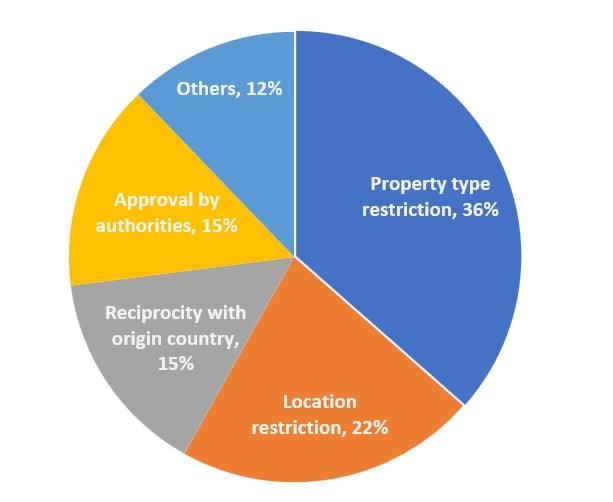In Observance of International Migrants Day (December 18)
Part I of this two-part blog addressed how the national laws of host countries affect the ability of migrants and refugees to access economic opportunities in a host country. In this blog, we focus on the treatment in the national laws of three other spheres of integration: housing, health, and political integration.
Housing. The Migration and the Law Study found that economic migrants face legal barriers are related to the purchase of agricultural, forest or rural land by foreigners (figure 1). Such policies are likely motivated by considerations relating to national security, indirect immigration control, and prevention of land speculation. The situation seems to be more complex in the case of refugees. Gaining refugee status typically affords the refugee a residency permit and identification document, which are needed to rent or purchase property. However, those who lack identification documents are often unable to find suitable housing.
Figure 1. Restriction on type of property (land or building) is a frequent condition cited for economic migrants to purchase property
Source: Authors’ calculation using the Migration and the Law database
Health. Migrants who are employed, pay taxes and contribute to social security or those with permanent residency tend to qualify for government health benefits on par with citizens. However, others face many hurdles including strict residency requirements, financial constraints, limited healthcare services, or reciprocity requirements.
The analysis showed that refugees receive relatively more favorable access to public healthcare than economic migrants. Two regions, East Asia and Pacific and South Asia, deviate from this general rule (figure 2).
Figure 2. Majority of surveyed countries are more open to integrating refugees into the public health care systems
Source: Authors’ calculation using the Migration and the Law database
Political Integration. The political integration indicator in the Migration and the Law database explored the regulatory frameworks surrounding economic migrants’ and refugees’ right to become permanent members of host societies. The analysis showed that permanent integration policies directly or indirectly prioritize financially stable, highly educated individuals with certain skill sets over lower-paid and less skilled migrants.
There is substantial variability in terms of citizenship application fees among sampled countries, ranging from approximately a mere US$2 (as of end of 2016) in Armenia to hundreds of dollars in many other countries, with rates noticeably higher in East Asia and Pacific (figure 3). The median of citizenship costs in sampled high-income OECD counties (HIO in figure 3) was US$263, higher than in other regions but lower than in EAP
Figure 3. Application fees for citizenship by economic migrants is highest in the EAP region
Source: Authors’ calculation using the Migration and the Law database
By highlighting the most common legal obstacles in the integration process, the study touches upon several policy goals that host countries could consider to better facilitate economic and social integration of migrants:
- Allow migrants access to adequate and affordable housing. Lift statutory restrictions for foreign ownership of property situated in areas reserved for citizens.
- Allow mandatory medical insurance for all workers and develop mechanisms to effectively address health challenges related to environmental and occupational exposures, especially in the case of low-wage migrants. The importance of inclusive healthcare policies was especially evident during the recent COVID-19 pandemic. Place migrants’ health policies into the domain of law, thereby removing political discretion and ad-hoc or case-by-case approaches which are more evident in the treatment of refugees.
- Facilitate permanent integration of all migrants by expediting permanent residency and naturalization procedures and reducing the charges and costs of such proceedings.
------------------------------------
Note: Part I of this two-part blog addresses how national laws govern access of migrants and refugees to economic opportunities.






Join the Conversation